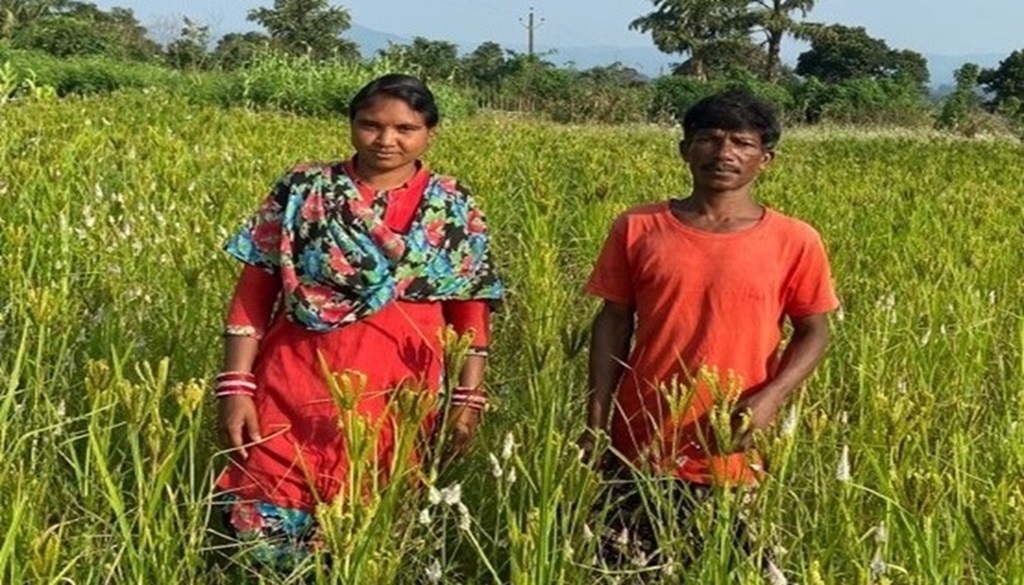Alladin Khila - A Champion of Millets Farming from Koraput
<p>Alladin Khila is a 30-year-old women entrepreneur cum farmer from Kandha Podapadar village of Koraput district, Odisha. Originally from Lenda village in the Rayagada district, Alladin’s journey from struggle to success is a testament to her resilience and determination.</p> <p>Growing up with her parents and five siblings, Alladin’s family enjoyed a comfortable life due to her father's sizeable landholdings. However, tragedy struck with her father's untimely death, plunging the family into sorrow and financial difficulty. She dropped out of school in 8<sup>th</sup> grade to support her family. She started working as an agricultural labourer, earning INR 70 per day. In 2014, at the age of 15, Alladin married Saheb Khila and relocated to Kandha Podapadar village in the Boipariguda block.</p> <p>Alladin had gained basic agricultural knowledge from her father, a progressive agriculturist. Post-marriage, the couple began farming various millets such as finger millet, foxtail millet, little millet, <em>khetachana</em>, and pearl millet. Previously, she spent around 15,000 – 16,000 INR per season for millet cultivation. Despite their hard work, the income was insufficient for their survival. The traditional method of sowing millets, harvesting and processing those were not environment-friendly.</p> <p>In 2017, Alladin's life took a significant turn when she learned about progressive agricultural methods through the training sessions at CYSD's Rural Livelihoods Training Centre (RLTC), where she learned about advanced and sustainable farming techniques. The System of Millet Intensification (SMI) method, a climate-resilient practice promoted by OMM, transformed her farming practices. Alladin's successful adoption of SMI on her 3-acre farm led her to a substantial increase in millet production.</p> <p>She received subsidy of around 8,000 INR for strictly adhering to the SMI technique and application of organic fertilisers like <em>jeevamrut</em> and <em>Handi Khata. </em>Besides, she was supported with farm implements and post-harvest machines, such as cycle weeder and thresher machine from the Custom Hiring Centre set up at her GP Office. The thresher machine helped her process around 60-70 kg of ragi per hour. The intervention of OMM facilitated by CYSD brought many changes to Alladin's life. With an investment of 15,000 – 16,000 INR in the cultivation of ragi, she now earns a profit of around 40,000 INR.</p> <p>Previously, Alladin was unable to feed her eight-member family from the yield of ragi. However, she is now one of the leading farmers in her village. She has influenced nearly 60 other farmers from her own and nearby villages to adopt practices such as the SMI, Line Sowing (LS), and Line Transplantation (LT). These methods enhance water use efficiency, improve soil health and reduce greenhouse gas emissions, making farming less vulnerable to climate change.</p> <p>In 2017, with the help of her husband Saheb, Alladin congregated a few Self-Help Groups (SHGs) in Boipariguda to found the Sabujima Producers Company. The company started processing and packaging various local products including turmeric, millet flour, and other non-timber forest products. They began selling these products at various fairs across the state and in local <em>haats</em> in Boipariguda block.</p> <p>In 2021, Alladin harvested 18 quintals of ragi from her 3 acres, achieving an average yield of 5 quintals per acre. Out of this harvest, she preserves 50 kg of ragi seeds for seed banks and kept enough ragi for their family’s consumption. Additionally, she was able to sell the surplus ragi in the local mandi and to other enterprises through the Farmer Producer Company (FPC), obtaining better value for her crop through the Minimum Support Price guarantee by the Government.</p> <p>A significant innovation in Alladin's agricultural practice is the use of <em>Haandi Khata</em>, an organic fertiliser made from cow dung, cow urine, leaves of <em>Karanja, Neem </em>&<em> Arakha, </em>gram flour and jaggery. This environmentally friendly fertiliser has doubled crop yields and reduced reliance on chemical fertilisers. Alladin trains other SHG women to prepare and use <em>Haandi Khata</em>, promoting sustainable farming practices in her region and contributing to a healthier ecosystem.</p> <p>In addition to her entrepreneurial ventures, Alladin is dedicated to preserving agricultural biodiversity. She has also started gathering and preserving endangered rice and millet seeds. By now, she has collected 13 different local varieties of millet from farmers, redistributing them to 55 other farmers. Maintaining a diverse gene pool of crops is vital to withstand changing climate conditions, pests, and diseases. Her efforts ensure the survival of these traditional crops and inspire others to value and protect their agricultural heritage.</p> <p>In the year 2023-2024, for her conservation work in saving indigenous seeds, she has been recognised by the Odisha Millets Mission, Government of Odisha.</p> <p>Alladin Khila’s journey from a struggling school dropout to a successful entrepreneur and community leader is a remarkable story of persistence and innovation. Her initiatives have not only transformed her own life but also she is a story of inspiration and motivation for the women in her village and beyond. Through sustainable agricultural practices, entrepreneurial spirit, and a commitment to climate resilient agriculture, Alladin lives a life of dignity and continues to inspire those around her. Her story is a powerful reminder of the impact one individual can have on an entire community!</p> <p> </p>
